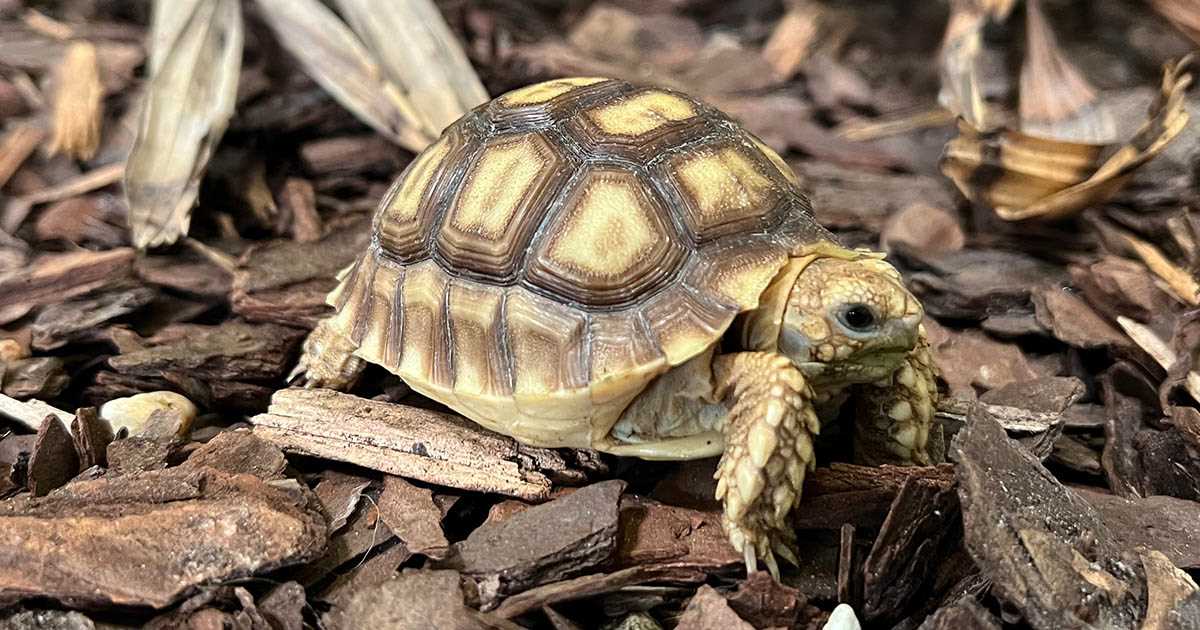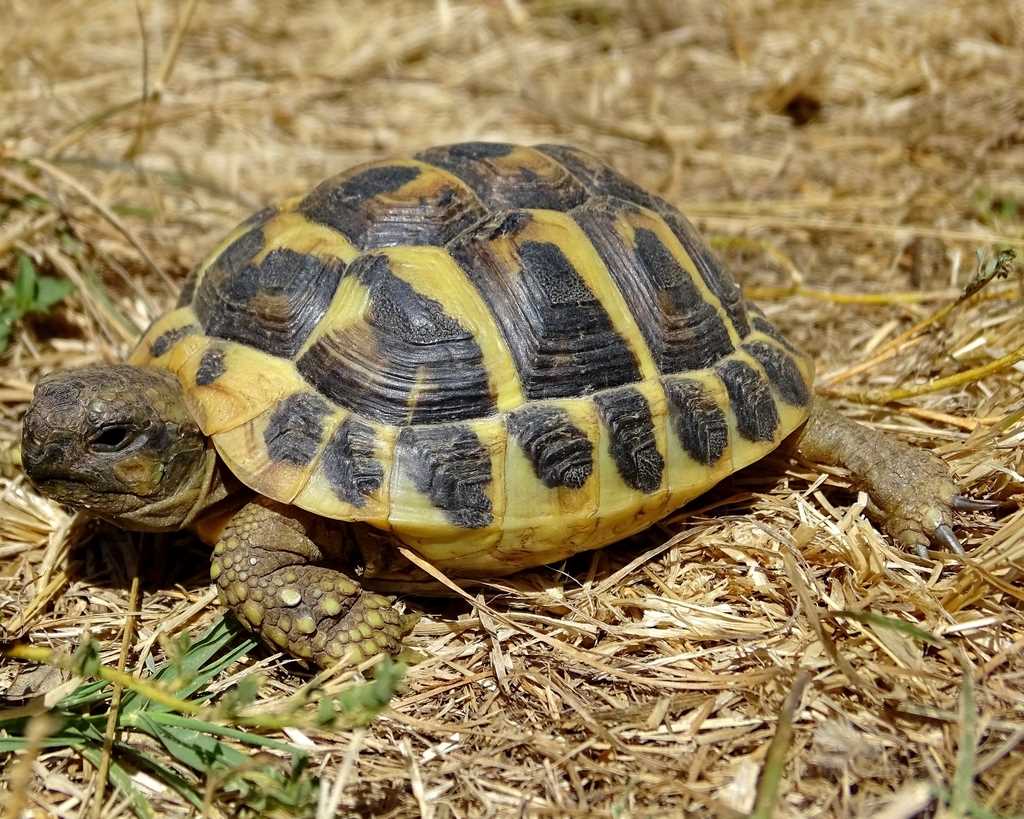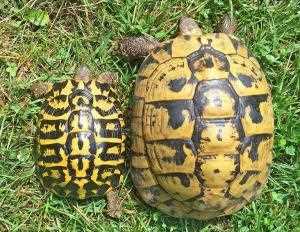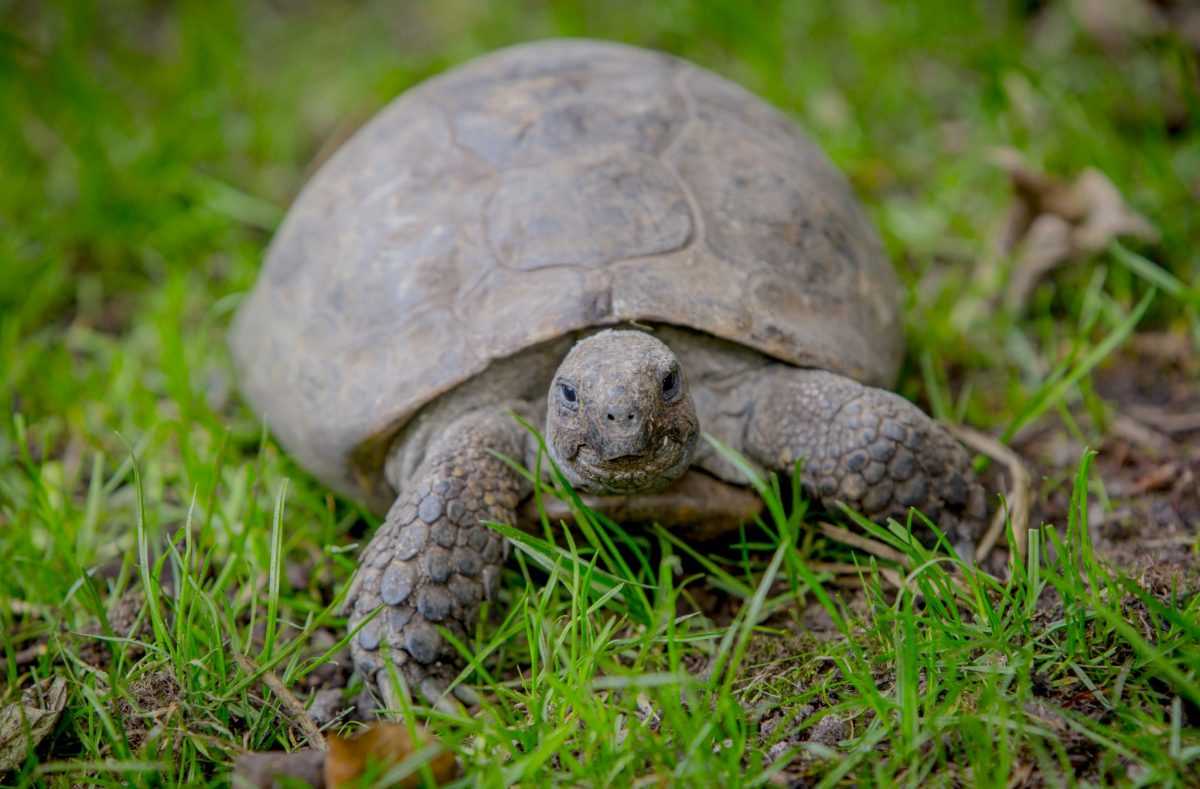
Proper care and nutrition play a crucial role in determining the lifespan of Hermann tortoises. These tortoises require a habitat that mimics their natural environment, with access to both UVB light and a spot to bask in the sun. They also need a varied diet consisting of leafy greens, vegetables, and occasional fruits.
Regular veterinary check-ups and a clean living environment are also essential for ensuring the longevity of Hermann tortoises. Additionally, providing them with opportunities for exercise and mental stimulation can contribute to their overall well-being and lifespan.
Hermann Tortoise: Life Expectancy
On average, a Hermann tortoise can live for 50 to 80 years in captivity, although there have been reports of some individuals living well into their 100s. The lifespan of a Hermann tortoise in the wild is slightly shorter due to various environmental factors.
| Factors Influencing Hermann Tortoise Lifespan | |
|---|---|
| Genetics: | The genetic makeup of Hermann tortoises plays a significant role in determining their lifespan. Some individuals may have genetic predispositions to certain health issues, while others may be more resilient and live longer. |
| Diet and Nutrition: | A well-balanced diet is crucial for the longevity of Hermann tortoises. They require a diet rich in calcium, fiber, vitamins, and minerals. Providing them with a variety of greens, vegetables, fruits, and occasional protein sources is essential for their overall health and well-being. |
| Habitat and Environmental Conditions: | Creating a suitable habitat for Hermann tortoises is vital for their longevity. They require an enclosure with proper temperature, humidity, and lighting conditions. A well-maintained and spacious living environment allows them to engage in natural behaviors, promoting their physical and mental well-being. |
| Healthcare and Veterinary Check-ups: | Regular veterinary check-ups and proper healthcare are essential for Hermann tortoises to live a long and healthy life. They should be examined for any signs of illness or disease and provided with necessary treatments or medications as recommended by a qualified reptile veterinarian. |
Hermann Tortoise Lifespan: How Long Do They Live?
Average Lifespan of Hermann Tortoises
The Hermann tortoise has a relatively long lifespan compared to many other reptiles. On average, they can live for about 50 to 100 years. However, there have been reports of Hermann tortoises living even longer, with some reaching the age of 150 years or more. This makes them one of the longest-living tortoise species.
Their long lifespan can be attributed to their slow metabolic rate, which helps them conserve energy and live for an extended period. Proper care and the right environmental conditions also play a crucial role in ensuring their longevity.
Factors Affecting Hermann Tortoise Lifespan
Several factors can influence the lifespan of Hermann tortoises:
- Diet and Nutrition: Providing a balanced and nutritious diet is essential for the overall health and longevity of Hermann tortoises. Their diet should primarily consist of dark, leafy greens, vegetables, fruits, and occasional protein sources like insects or worms.
- Habitat and Environmental Conditions: Creating a suitable habitat for Hermann tortoises is crucial. They require a spacious enclosure with a mix of vegetation, hiding spots, and a basking area. The temperature and humidity levels should be maintained within their preferred range.
- Healthcare and Veterinary Care: Regular veterinary check-ups and proper healthcare are necessary to detect any underlying health issues early on. Providing a clean environment and keeping them free from parasites is also important for their well-being.
By addressing these factors, you can help ensure a long and healthy life for your Hermann tortoise. Additionally, providing mental stimulation, proper exercise, and a stress-free environment can contribute to their overall well-being.
Conclusion
Factors Affecting Hermann Tortoise Lifespan
Genetics: Genetics play a significant role in determining the lifespan of Hermann tortoises. Some individuals may inherit genes that make them more resilient and long-lived, while others may have genetic predispositions to certain health issues that can shorten their lifespan.
Hydration: Proper hydration is essential for the well-being of Hermann tortoises. They require access to clean water at all times, as dehydration can lead to organ failure and other health issues. Lack of access to water or poor water quality can significantly affect their lifespan.
Appropriate Enclosure Size: The size of the enclosure also plays a role in a Hermann tortoise’s lifespan. These tortoises need enough space to roam, explore, and exercise. Inadequate space can lead to stress, obesity, and other health problems. Providing a spacious enclosure with hiding spots, climbing areas, and appropriate substrate promotes their natural behavior and overall well-being.
Veterinary Care: Regular check-ups with a qualified reptile veterinarian are crucial for ensuring the health and longevity of Hermann tortoises. Routine examinations, vaccinations, and parasite control can help detect and prevent potential health problems, extending their lifespan.
Stress and Handling: Hermann tortoises are sensitive to stress and excessive handling. Frequent or rough handling can cause them to become anxious and fearful, which can impact their overall health. Minimizing stress and providing a calm and safe environment is essential for their well-being and optimum lifespan.
Overall Care: Providing proper care and attention to a Hermann tortoise throughout its life is vital for its longevity. This includes regular cleaning of the enclosure, providing appropriate UVB lighting and heating, maintaining proper humidity levels, and offering a suitable diet. Neglecting these aspects can lead to various health issues and shorten their lifespan.
Habitat and Environmental Conditions for Hermann Tortoises

Hermann tortoises are native to the Mediterranean region, specifically countries such as Spain, Italy, and Greece. They are typically found in dry and rocky areas, as well as in scrublands and forests.
These tortoises require a suitable habitat to thrive. It is crucial to provide them with an environment that closely mimics their natural surroundings.
Temperature: Hermann tortoises are ectothermic, which means they rely on external sources to regulate their body temperature. It is essential to provide a temperature gradient in their habitat, ensuring they have access to both warm and cooler areas. The ideal temperature range for these tortoises is between 80-90 degrees Fahrenheit (26-32 degrees Celsius).
Lighting: Proper lighting is crucial for the well-being of Hermann tortoises. They require exposure to ultraviolet B (UVB) light, which helps them synthesize vitamin D3 and metabolize calcium. It is recommended to provide them with full-spectrum UVB lighting for 10-12 hours a day. This can be achieved with the use of UVB light bulbs specifically designed for reptiles.
Humidity: Hermann tortoises prefer a moderately humid environment. The humidity levels in their enclosure should be maintained at around 50-60%. This can be achieved by misting the habitat regularly and providing a shallow water dish for drinking and soaking.
Substrate: The substrate in the enclosure should resemble their natural habitat. A mixture of topsoil, sand, and other organic materials can be used. It should be deep enough for the tortoise to dig and burrow comfortably.
Shelter and Hiding spots: Provide ample hiding spots such as rocks, logs, and plants for the tortoise to retreat to when it feels threatened or wants to rest. These hiding spots should be easily accessible and scattered throughout the habitat.
Enclosure size: Hermann tortoises require a spacious enclosure to roam and explore. The size of the enclosure will depend on the size and number of tortoises you have. As a general guideline, a single adult tortoise should have an enclosure size of at least 4 feet by 2 feet.
Plant life: Including live plants in the tortoise’s habitat not only provides them with a naturalistic environment but also serves as a source of food and shelter. Ensure that the plants are non-toxic to the tortoise and can withstand the conditions in the enclosure.
By providing a suitable habitat with the right environmental conditions, you can help ensure a long and healthy life for your Hermann tortoise.
Hermann Tortoises: Diet and Nutrition
1. Foraging and Grazing
In their natural habitat, Hermann tortoises spend a significant amount of time foraging and grazing on a variety of plants, weeds, and grasses. Mimicking this natural feeding behavior is essential in their captive diet. Provide a wide range of edible plants and greens for them to nibble on. Ensure that the plants are safe and suitable for tortoises, avoiding toxic or harmful varieties. It is beneficial to establish a tortoise-friendly garden or enclosure with a diverse selection of vegetation.
2. Variety of Foods

Hermann tortoises thrive on a diverse diet that includes various plant species. Supplement their primary diet with a variety of leafy greens, such as dandelion greens, collard greens, kale, and mustard greens. Other suitable vegetables for Hermann tortoises include turnip greens, escarole, and endive. Occasionally, you can offer fruits like strawberries, apples, and melons as treats. However, fruits should be given sparingly due to their high sugar content.
3. Calcium and Vitamin D3
Calcium and vitamin D3 are essential for the growth and overall health of Hermann tortoises. Calcium helps in developing strong shells, bones, and proper muscle function. Vitamin D3 aids in calcium absorption. These tortoises require a calcium-rich diet to prevent metabolic bone disease. Provide calcium supplements in the form of cuttlefish bone, powdered calcium, or reptile calcium powder sprinkled on their food. Natural sunlight exposure or UVB lighting is also crucial as it helps in the synthesis of vitamin D3.
4. Limited Protein and High-Fiber Diet
Hermann tortoises are predominantly herbivorous, so their diet should be low in protein. A high-protein diet can lead to various health issues, including kidney problems. Avoid feeding them animal-based proteins or excessive amounts of protein-rich foods. Additionally, their diet should be high in fiber to promote healthy digestion. Offering fibrous foods like hay, grass, and some edible weeds can help ensure proper gut function.
5. Hydration
Proper hydration is vital for Hermann tortoises. Ensuring a constant supply of fresh, clean water is essential. However, they may not drink from a shallow dish, so it is necessary to soak them in a shallow water bath regularly to satisfy their hydration needs. Soaking also aids in maintaining proper hydration and assists in shedding.
| Food | Frequency | Portion Size |
|---|---|---|
| Leafy Greens | Daily | 1-2 handfuls |
| Vegetables | 2-3 times per week | 1-2 tablespoons |
| Fruits | Occasional treats | Small pieces |
| Calcium Supplements | 2-3 times per week | As per instructions |
By providing a well-balanced diet and following these guidelines, you can help ensure a long and healthy life for your Hermann tortoise. Always consult with a reptile veterinarian or tortoise specialist for specific dietary recommendations based on your tortoise’s age, size, and any underlying health conditions.
Care and Maintenance of Hermann Tortoises
Hermann tortoises require proper care and maintenance to ensure a long and healthy life. Here are some guidelines to follow:
- Habitat: Provide a suitable habitat for your Hermann tortoise. This should include a spacious enclosure with both a warm basking area and a cooler area for them to retreat to. The enclosure should also have hiding spots and plants to mimic their natural environment.
- Temperature and Lighting: Maintain proper temperature and lighting conditions in the enclosure. Provide a basking spot with a temperature between 95-100°F (35-38°C) and a cooler area with a temperature around 70-80°F (21-27°C). Use a UVB light to provide the necessary ultraviolet radiation.
- Hygiene: Keep the enclosure clean and hygienic by regularly removing any waste and uneaten food. Clean the water dish daily and provide fresh water.
- Handling: Handle your Hermann tortoise with care and only when necessary. They can be easily stressed, so limit handling to avoid causing them unnecessary discomfort.
- Veterinary Care: Schedule regular visits to a reptile veterinarian to ensure your Hermann tortoise’s health. They may require deworming, parasite checks, and vaccinations.
- Enrichment: Provide enrichment activities for your Hermann tortoise to stimulate their mind and encourage natural behaviors. This can include providing toys, different textures to explore, and opportunities for them to dig and burrow.
By following these care and maintenance guidelines, you can help ensure a long and healthy life for your Hermann tortoise.
Common Health Issues in Hermann Tortoises
Hermann tortoises, like any other living creatures, are susceptible to various health issues. It is essential for tortoise owners to be aware of these common health problems to ensure the well-being and longevity of their pets.
Respiratory Infections:
Respiratory infections are one of the most prevalent health issues in Hermann tortoises. These infections can be caused by inadequate housing conditions, such as low temperatures or high humidity levels. Signs of respiratory infections include wheezing, discharge from the nose or mouth, and lethargy. A tortoise with a respiratory infection should receive immediate veterinary care.
Shell Rot:

Shell rot is a fungal or bacterial infection that affects the tortoise’s shell. It usually occurs when the tortoise’s habitat is damp, dirty, or poorly maintained. Shell rot can cause the shell to become soft, discolored, and even develop a foul odor. If left untreated, shell rot can lead to severe damage and compromise the tortoise’s overall health. Regular cleaning and proper habitat maintenance can help prevent shell rot.
Parasites:
Tortoises, including Hermann tortoises, can be infested with internal and external parasites. Internal parasites, such as worms, can cause digestive problems and weight loss. External parasites, such as ticks and mites, can irritate the tortoise’s skin and lead to infections. Regular fecal exams and proper hygiene practices can help prevent parasite infestations. If a tortoise is infested, appropriate treatment should be administered under the guidance of a veterinarian.
Dietary Issues:
A poor diet can significantly impact a Hermann tortoise’s health and lifespan. Insufficient nutrition, excessive protein intake, or an imbalanced diet can lead to metabolic bone disease, shell deformities, and organ dysfunction. It is crucial to provide a well-rounded diet consisting of fresh vegetables, fruits, and calcium-rich foods. Vitamin and mineral supplements may also be necessary, particularly for young tortoises.
Overgrowth of Beak and Nails:
Hermann tortoises, like other tortoise species, have continuously growing beaks and nails. If not properly maintained, the beak and nails can become overgrown, making it challenging for the tortoise to eat and walk comfortably. Regular trimming of the beak and nails is necessary to prevent any complications and ensure the tortoise’s well-being.
Conclusion:
Being aware of and addressing these common health issues in Hermann tortoises is crucial for their long and healthy life. Regular veterinary check-ups, a proper diet, a clean habitat, and good hygiene practices are essential for preventing and managing these health problems. Providing optimal care and attention to your Hermann tortoise will help ensure a happy and thriving companion for many years to come.
How to ensure a long and healthy life for your Hermann tortoise?
Life expectancy:
The average life expectancy of a Hermann tortoise is around 50 to 100 years. However, with proper care and maintenance, these tortoises can live even longer.
Provide a suitable habitat:
A crucial factor in ensuring a long and healthy life for your Hermann tortoise is providing it with a suitable habitat. Create an enclosure with adequate space for the tortoise to roam and explore. The enclosure should include both sunny and shaded areas, as well as a hiding spot for the tortoise to retreat to when it feels stressed or threatened.
Optimal environmental conditions:
Maintaining the right environmental conditions is essential for the well-being of your Hermann tortoise. The enclosure should have a temperature gradient, with a warm basking spot and a cooler area. The ideal temperature range is between 80 to 90 degrees Fahrenheit (27 to 32 degrees Celsius). Also, ensure that the humidity levels are kept at around 50 to 60 percent to prevent any respiratory issues.
Nutritious diet:
Regular veterinary check-ups:
Regular visits to a reptile veterinarian are important to ensure that your Hermann tortoise remains in good health. A veterinarian will be able to conduct routine check-ups, perform necessary vaccinations, and provide any required treatments or medications.
Provide mental stimulation:
Ensuring your Hermann tortoise has mental stimulation is essential for its overall well-being. Provide various enrichment activities, such as hiding treats for it to find, introducing toys or objects to explore, and creating a habitat with different textures and surfaces.
Monitor for any health issues:
Observe your Hermann tortoise closely for any signs of illness or distress. Common health issues in Hermann tortoises include respiratory infections, shell infections, and parasites. Promptly address any health concerns by consulting a reptile veterinarian.
Regular exercise:
Encourage your Hermann tortoise to exercise by providing it with opportunities for physical activity. Allow it to explore outside its enclosure under supervision, provide climbing structures, and encourage it to move around within its enclosure. Regular exercise will help keep your tortoise physically fit and prevent obesity.
Minimize stress:
Minimizing stress is vital for the overall well-being of your Hermann tortoise. Avoid loud noises, sudden temperature changes, and excessive handling. Provide a calm and quiet environment for your tortoise to thrive.
Keep a clean enclosure:
Maintaining a clean and hygienic enclosure is crucial for your Hermann tortoise’s health. Regularly clean and disinfect the enclosure to prevent the growth of harmful bacteria. Also, ensure that the substrate is kept clean and dry, as excessive moisture can lead to shell rot.
Conclusion:
By following these guidelines and providing proper care, nutrition, and a suitable environment, you can ensure a long and healthy life for your Hermann tortoise. Remember to consult with a reptile veterinarian for any specific care recommendations or concerns.

I’m Lena Adams—a product of an unconventional upbringing in the African wilderness. My father, a daring explorer of African wildlife, sparked my fascination with reptiles, a passion that intertwined with the tragic loss of my mother during an expedition, leaving an indelible mark on my life. Driven to understand the creatures that captivated my parents, I embarked on my journey, sharing insights about reptiles, frogs, and lizards on my website. Through my explorations and conservation efforts, I honour my family’s legacy while seeking connections—to the creatures, nature, and the mother whose presence I yearn to understand.
